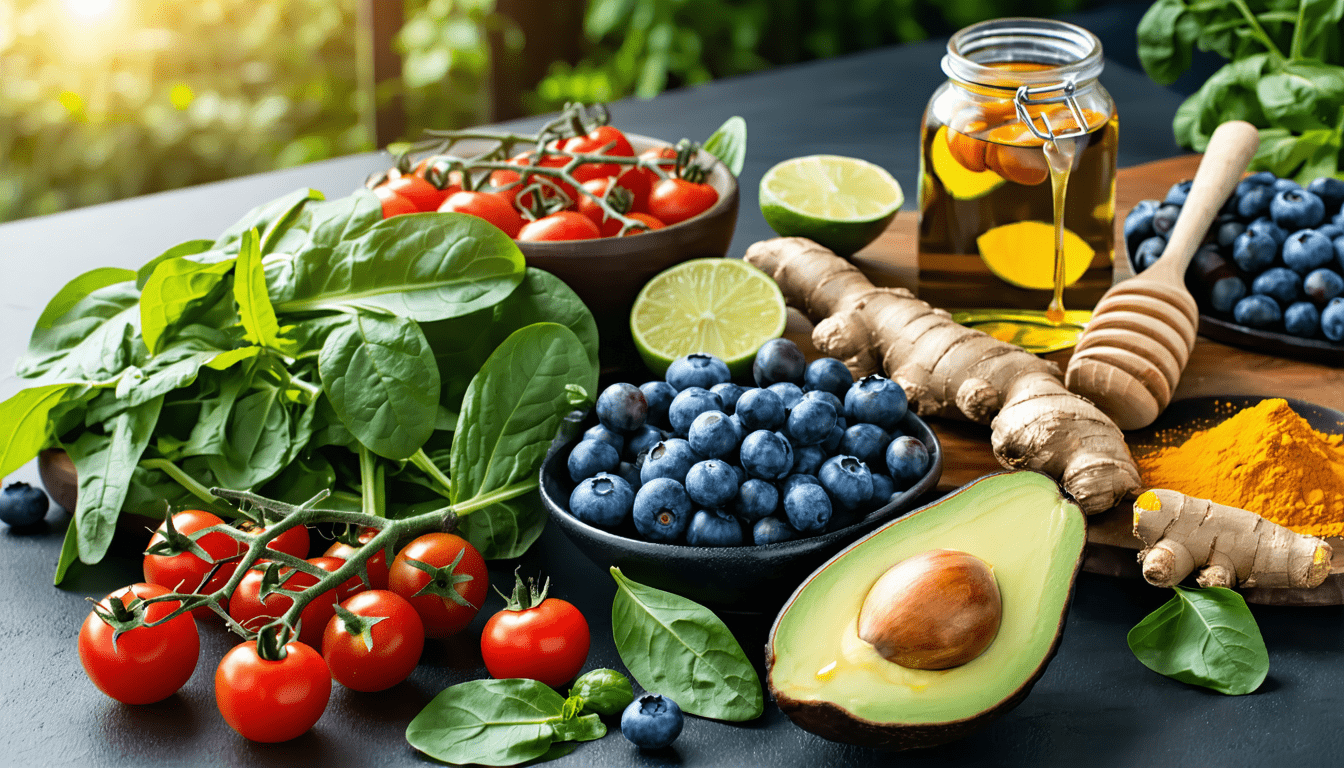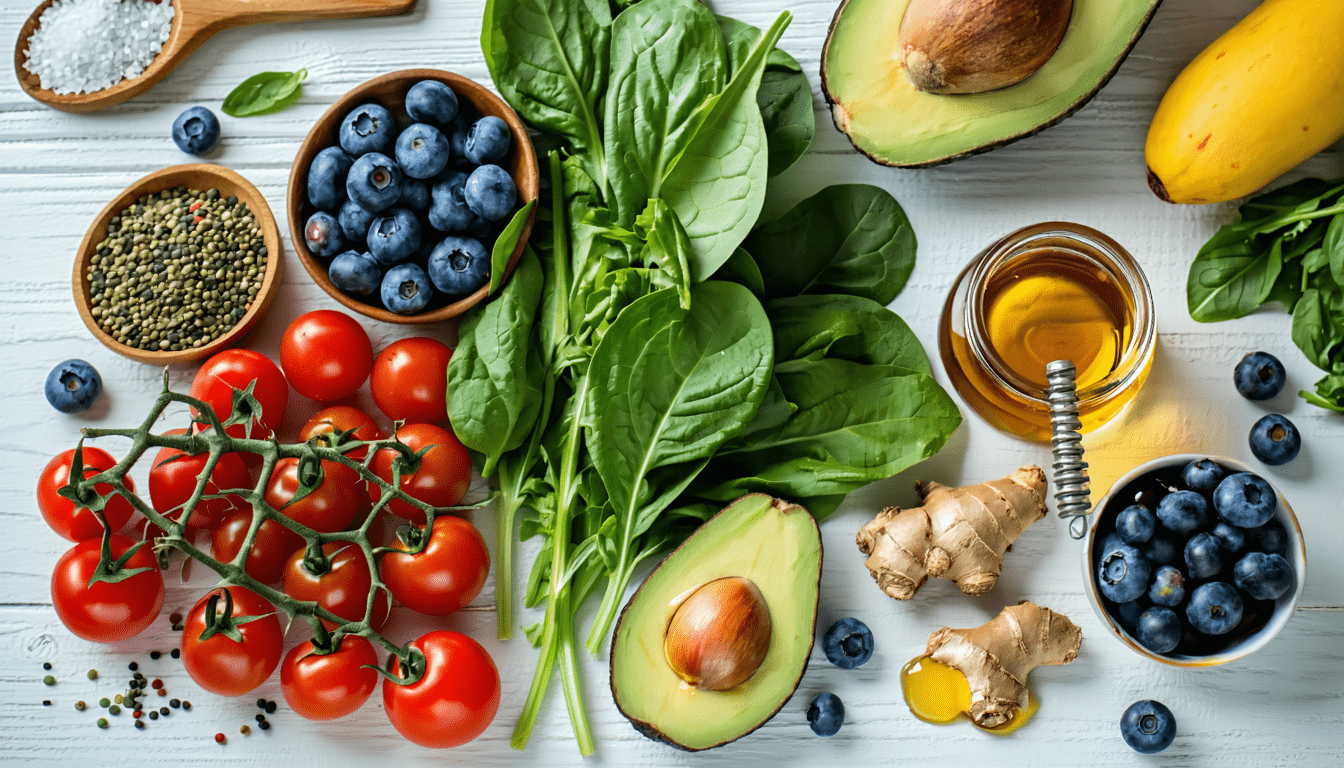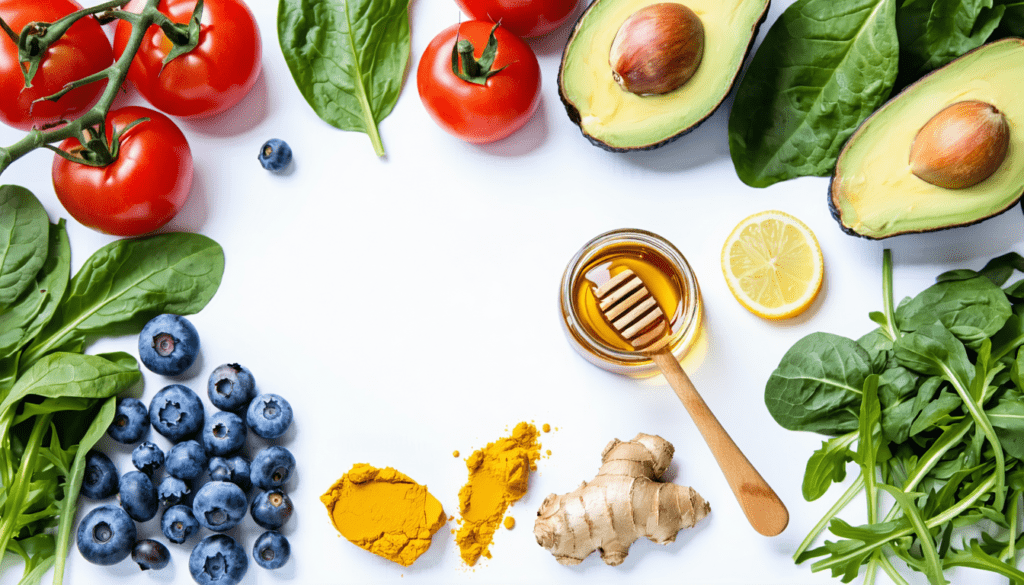|
IN BRIEF
|
In today’s health-conscious world, understanding the significance of anti-inflammatory foods has become increasingly essential. Chronic inflammation is linked to various health concerns, including heart disease, diabetes, and certain cancers. By incorporating specific foods into our diets, we have the power to combat inflammation and promote overall well-being. Nutrient-rich options like leafy greens, fatty fish, and colorful fruits not only enhance our meals but also provide vital elements that help reduce inflammation in the body. This exploration of anti-inflammatory foods unveils the benefits they offer, paving the way for healthier lifestyle choices.

Chronic inflammation can lead to a myriad of health complications, ranging from autoimmune diseases to heart problems. One effective way to combat this issue is through the consumption of anti-inflammatory foods. These foods are rich in vitamins, minerals, antioxidants, and other essential nutrients that work in tandem to reduce inflammation in the body. In this article, we will explore the significance of anti-inflammatory foods, the types of food that qualify, as well as the specific health benefits they offer.
The Role of Inflammation in Our Health
Inflammation is a natural response by the body to protect against injury and infection. However, when inflammation becomes chronic, it can wreak havoc on the body’s systems. Many common dietary choices contribute to this chronic inflammation, leading to a decline in overall health. Processed foods, sugary beverages, and refined carbohydrates are just a few examples of pro-inflammatory foods that can exacerbate inflammation and increase the risk of serious health issues.
What Are Anti-Inflammatory Foods?
Anti-inflammatory foods are those that help mitigate inflammatory responses in the body. They typically contain high levels of antioxidants, omega-3 fatty acids, vitamins, and minerals. Incorporating these foods into your diet can help lower the levels of inflammatory proteins, thus promoting better health. Foods like wild-caught fish, leafy greens, berries, and nuts are considered top choices when looking to reduce inflammation in the body.
Top Foods to Include in an Anti-Inflammatory Diet
While there are countless foods with anti-inflammatory properties, some stand out as particularly effective. Let’s explore a few key examples:
Wild-Caught Fish
Fish rich in omega-3 fatty acids, such as salmon and mackerel, are essential anti-inflammatory foods. Omega-3s are known to fight inflammatory processes in the body and are linked to improved heart health.
Leafy Greens
Greens like spinach and kale are packed with vitamin K and antioxidants, both of which help reduce inflammation while also providing a wealth of other health benefits.
Special Spices
Spices such as turmeric and ginger are powerful anti-inflammatory agents. Curcumin, the active compound in turmeric, has been shown to significantly lower inflammation in the body.
Nuts and Seeds
Nuts, especially walnuts and almonds, offer a rich source of healthy fats and can help combat inflammation. They contain fiber and essential nutrients that are beneficial for overall health.
Fruits and Vegetables
A diverse array of fruits and vegetables should be a cornerstone of any anti-inflammatory diet. Foods like berries, oranges, bell peppers, and garlic lead the way in delivering essential nutrients that help in inflammation reduction.
Health Benefits of an Anti-Inflammatory Diet
Transforming your diet by incorporating anti-inflammatory foods can have profound effects on your health. Some notable benefits include:
Reduced Risk of Chronic Diseases
A diet rich in anti-inflammatory foods can lower the risk of developing chronic diseases, such as heart disease and type 2 diabetes, by mitigating the impacts of chronic inflammation.
Improved Gut Health
Many anti-inflammatory foods are also high in fiber, which supports gut health. A healthy gut microbiome is crucial for overall well-being and can significantly reduce inflammation.
Enhanced Brain Function
Research suggests that diets high in anti-inflammatory foods may reduce the risk of cognitive decline. Antioxidants and healthy fats found in these foods are essential for brain health.
How to Incorporate Anti-Inflammatory Foods into Your Diet
Making changes to your diet to include more anti-inflammatory foods can be surprisingly easy. Begin with small adjustments, such as swapping out refined oils for unprocessed olive oil and including more fruits and vegetables at every meal. Gradually replace processed snacks with nuts or fresh fruits to maintain your energy levels and keep inflammation at bay.
For those interested in enhancing their approach to combating inflammation, consider exploring natural supplements like CBD, which have been noted for their potential anti-inflammatory properties. To find out more, visit this link.
| Food Type | Key Benefits |
| Wild-Caught Fish | Rich in omega-3 fatty acids, which help reduce inflammatory markers. |
| Spices (e.g., Turmeric) | Contains curcumin, known for its potent anti-inflammatory effects. |
| Unprocessed Olive Oil | High in oleic acid and antioxidants which protect against inflammation. |
| Leafy Greens | A good source of vitamins K and antioxidants, promoting lower inflammation. |
| Berries | Packed with antioxidants that combat oxidative stress and inflammation. |
| Garlic | Contains sulfur compounds that may help regulate inflammatory processes. |
| Whole Grains | Rich in fiber, which helps lower inflammatory markers in the body. |
| Yellow and Orange Fruits/Veggies | High in carotenoids, which have been linked to reduced inflammation. |
| Dark Chocolate | Rich in flavonoids that can lower inflammation and improve heart health. |
| Nuts | Provide healthy fats and antioxidants that may reduce inflammation levels. |

Chronic inflammation has become a pressing health issue, closely linked to numerous debilitating conditions. By understanding the role of anti-inflammatory foods, we can proactively manage inflammation levels in our bodies. This article explores the benefits of adopting an anti-inflammatory diet, highlights key foods to include, and outlines the detrimental effects of pro-inflammatory foods.
The Impact of Chronic Inflammation
Chronic inflammation occurs when the body’s natural response to injury or infection lingers for an extended period. This can result in various health problems, including heart disease, diabetes, and arthritis. An understanding of the mechanisms behind inflammation reinforces the necessity of incorporating anti-inflammatory foods into our daily nutrition.
Foods That Fight Inflammation
Implementing an anti-inflammatory diet primarily involves prioritizing whole fruits and vegetables, whole grains, and healthy fats. Foods rich in vitamins, minerals, antioxidants, and omega-3 fatty acids are particularly effective in combating inflammation. For instance, wild-caught fish—laden with omega-3s—provides powerful anti-inflammatory properties. Additionally, spices like turmeric and healthy fats such as unprocessed olive oil can enhance your body’s defenses against inflammatory processes.
Essential Anti-Inflammatory Foods
To optimize your anti-inflammatory diet, consider incorporating a variety of nutrient-rich foods. Leafy greens such as spinach and kale, along with vibrant fruits and vegetables spanning the rainbow, deliver a plethora of essential nutrients. Garlic is another potent ingredient, known for its anti-inflammatory effects and ability to bolster immune function.
Pro-Inflammatory Foods to Avoid
As crucial as it is to know which foods to embrace, it is equally important to identify and avoid pro-inflammatory foods. Common culprits include processed foods, fried items, sugary sodas, refined carbohydrates, and excess red meat. By minimizing these foods, you can significantly reduce your body’s inflammatory responses and promote overall health.
The Benefits of an Anti-Inflammatory Diet
Incorporating anti-inflammatory foods into your diet can lead to a myriad of health benefits. Research indicates that this dietary approach can help lower inflammatory markers in the body, potentially reducing the risk of chronic diseases. Furthermore, anti-inflammatory foods can improve overall well-being, increase energy levels, and support a healthier weight.
As the link between diet and inflammation becomes increasingly clear, shifting towards an anti-inflammatory diet is a proactive measure for better health. By understanding which foods to include and which to avoid, you can take significant steps toward controlling inflammation and enhancing your overall quality of life.
Foods to Embrace
- Wild-Caught Fish: Rich in omega-3 fatty acids.
- Leafy Greens: Vitamin K-rich options like spinach and kale.
- Spices: Turmeric offers powerful anti-inflammatory properties.
- Olive Oil: A healthy fat that supports heart health.
- Fruits and Vegetables: Aim for a rainbow, focusing on berries.
Foods to Avoid
- Fried Foods: High in unhealthy trans fats.
- Sweets and Sodas: Promote inflammation due to high sugar content.
- Refined Carbohydrates: Such as white bread and pastries.
- Processed Meats: Often contain preservatives linked to inflammation.
- Excessive Red Meat: Can introduce pro-inflammatory compounds.
Chronic inflammation is a significant health issue linked to various ailments, including heart disease, diabetes, and arthritis. The food we consume plays a crucial role in either exacerbating or reducing this inflammation. An anti-inflammatory diet emphasizes the consumption of specific foods that can help combat inflammation while limiting those that promote it. This article explores the fundamental aspects of anti-inflammatory foods, the health benefits associated with them, and practical recommendations for incorporating them into your diet.
The Role of Inflammation in Health
Inflammation is a natural response by the body to injury or infection, playing a protective role in healing. However, when inflammation becomes chronic, it can lead to various health problems. Factors such as diet, lifestyle, and environmental influences can contribute to a state of ongoing inflammation. Understanding this relationship is critical for making dietary choices that support overall wellness.
Foods That Fight Inflammation
Incorporating anti-inflammatory foods into your diet can significantly improve your health. Below are some key categories of foods known for their anti-inflammatory properties:
Fatty Fish
Fatty fish, such as salmon, mackerel, and sardines, are high in omega-3 fatty acids, which have potent anti-inflammatory effects. These healthy fats work to lower inflammatory proteins in the body, making them a vital component of an anti-inflammatory diet.
Fruits and Vegetables
Opting for a variety of colorful fruits and vegetables can provide a robust array of antioxidants and vitamins. Leafy greens like kale and spinach, alongside berries, oranges, and peppers, are particularly rich in vitamin C and antioxidants that combat inflammation.
Whole Grains
Whole grains such as quinoa, brown rice, and oats are excellent sources of fiber. High-fiber foods help to reduce inflammation by promoting gut health and regulating blood sugar levels, making them essential in any anti-inflammatory diet.
Healthy Fats
Incorporating unprocessed olive oil and nuts into your meals can provide beneficial fats that reduce inflammation. These fats, especially from sources like walnuts and avocados, are loaded with nutrients and omega-3 fatty acids.
Spices
Spices like turmeric and ginger are not just flavor enhancers; they are also packed with anti-inflammatory properties. Curcumin, the active compound in turmeric, has shown to reduce inflammation in various studies, making it a powerful addition to meals.
Foods to Avoid
While incorporating anti-inflammatory foods, it is equally important to limit or avoid pro-inflammatory foods. Common culprits include:
- Processed foods high in sugar and refined carbohydrates
- Fried foods and trans fats
- Excessive red meat
- Sugary beverages like sodas
These foods can exacerbate inflammation and undermine efforts to achieve a balanced, healthful diet.
Practical Tips for an Anti-Inflammatory Diet
Transitioning to an anti-inflammatory diet doesn’t have to be overwhelming. Here are some simple steps to consider:
- Start by adding a serving of fatty fish to your weekly meal plan.
- Incorporate a variety of colorful fruits and vegetables into your daily meals.
- Replace refined grains with whole grains in your snacks and meals.
- Choose healthy fats from avocados and nuts instead of saturated fats.
- Experiment with spices when cooking to boost flavor and health benefits.
Making these dietary changes can be beneficial in reducing inflammation and enhancing overall health and well-being.
FAQ on Anti-Inflammatory Foods and Their Benefits
What are anti-inflammatory foods? Anti-inflammatory foods are those that help reduce inflammation in the body. These include fruits, vegetables, whole grains, nuts, fish, and healthy fats, which are rich in nutrients and beneficial compounds.
Why is it important to eat anti-inflammatory foods? Consuming anti-inflammatory foods can help combat chronic inflammation, which is linked to various health issues such as heart disease, diabetes, and certain cancers. A diet rich in these foods can promote overall health and well-being.
Can you provide examples of anti-inflammatory foods? Yes! Some examples include wild-caught fish, leafy greens like spinach and kale, berries, turmeric, garlic, and unprocessed olive oil. A variety of colorful vegetables also contributes to an anti-inflammatory diet.
What foods should be avoided to reduce inflammation? It’s advisable to limit or avoid pro-inflammatory foods, such as fried foods, sodas, refined carbohydrates, and red meat, as these can contribute to increased inflammation in the body.
How do anti-inflammatory foods work? Anti-inflammatory foods contain compounds like antioxidants, omega-3 fatty acids, vitamins, and minerals that help combat inflammatory proteins and promote healing in the body.
Is there scientific research supporting the benefits of an anti-inflammatory diet? Yes, numerous studies suggest that an anti-inflammatory diet can enhance health by reducing inflammation, improving heart health, and even lowering the risk of chronic conditions.
How can I incorporate anti-inflammatory foods into my diet? Start by including a variety of fruits and vegetables in your meals, choose whole grains over refined ones, add healthy fats like those found in olive oil and nuts, and incorporate more fish into your diet. Aim for balance and variety to maximize the benefits.



